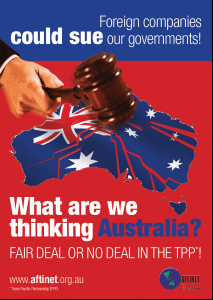The US Labor Advisory Committee on Trade Negotiations and Trade Policy includes representatives of every major labor union and labor coalition in America.
Its report commences:
Dear Mr. President:
…….
The LAC strongly opposes the TPP, negotiated between the United States (U.S.), Australia, …… We believe that the Agreement fails to advance the economic interests of the U.S. and does not fulfill all of the negotiating objectives identified by Congress in the Trade Priorities and Accountability Act of 2015.
The threat to future economic gains here in the U.S. and the standard of living of our people will be put in jeopardy by the Agreement.
These threats will grow over time based on the potential for open ended expansion of the TPP to countries ranging from Indonesia to China.
The LAC believes the agreement should not be submitted to Congress or, if it is, it should be quickly rejected. The interests of U.S. manufacturers, businesses, workers and consumers would be severely undermined by the entry into force of the TPP.
Sincerely,…….
Full text, external link, WARNING 124 pages of pdf LAC Report
For a more readable interpretation, Leo W. Gerard, International President, United Steelworkers, external link Burn the TPP.
